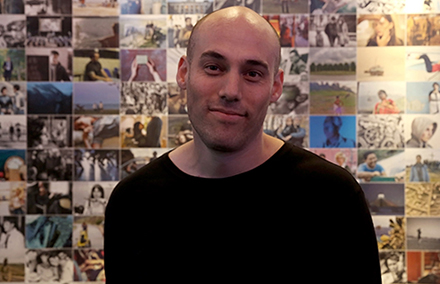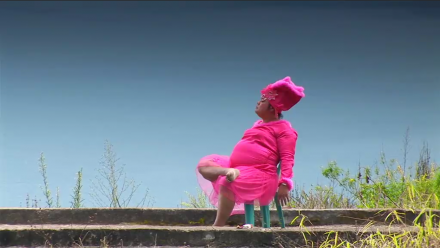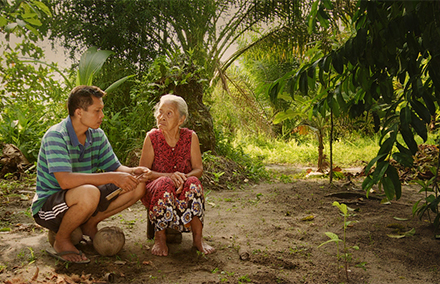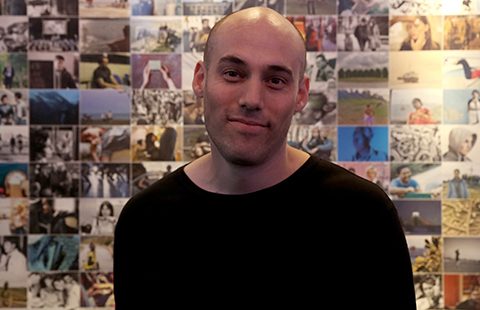
Joshua Oppenheimer. Photo: Manfred Werner/ Wikimedia commons
Following an International People’s Tribunal on Indonesia’s 1965 massacre, which accused the Indonesian government of murder and torture and which Vice President Jusuf Kalla dismissed as “drama“, Stanley Widianto talks to Joshua Oppenheimer – acclaimed director of two films dealing with the violence and its consequences, The Act of Killing (Jagal) and The Look of Silence (Senyap).
The two discuss truth and justice 50 years after the killings, press coverage of this dark past and media self-censorship, the blight of ongoing corruption, and the impact of Oppenheimer’s films.
Stanley begins by asking Joshua about the significance of the tribunal in The Hague and whether it was just ‘legalese’.
Joshua Oppenheimer (JO): It’s not legalese.
It’s a determination of what sort of crime occurred; what kind of crime against humanity occurred. It cannot be a perfect determination, because it’s based only on the evidence that the International People’s Tribunal (IPT) has available.
It’s hardly legalese. Imagine if your neighbour murdered one of your family, having it acknowledged as murder is not legalese; that’s the very beginning of a truth process.
Stanley Widanto (SW): So we’re not really trying to try anyone?
JO: Well, IPT is not a trial, right? It has no legal authority, it has no legal mandate. It is a systematic presentation of what evidence is available in the absence of a robust truth commission. Given that the National Commission on Human Rights, Komnas HAM’s, 800-page report on what happened has been kept secret, I think it should be public.
So, in the absence of any truth process, the IPT is a way to gather evidence in a systematic way and on the basis of what evidence can be gathered; determining what kind of crime it was. It’s very important in terms of establishing a counter-memory, kind of a robust acknowledgment that this was not a heroic penumpasan PKI [PKI, or Communist Party of Indonesia, slaughter].
SW: International exposure helped catalyse conversation about what happened in 1965, but consecutive governments have stopped short of an apology. If the international press didn’t care about Senyap as much as they do now, would the effect taking place here be as big?
JO: I think there’s a number of issues here. First of all, the most important impact of these two films is that they’ve helped shift the public conversation. And where does the conversation happen? It happens in the media.
When you talk about the international exposure, I would say that the most important coverage of the film has been in the Indonesian press. According to my team in Indonesia, there have been over 3,000 articles about Senyap and a similar number about Jagal. So that’s 6,000 reports in the press about these films. That’s an average of five or six a day in three years.
The most important coverage is not from the international press. There’s been far more coverage in Indonesia than all of the Western countries combined.
And the most important piece is of course, this.
[Joshua picks up Tempo magazine’s special edition on 1965]
Right? It’s a double-edition of the most important news magazine in the country dedicated to showing that The Act of Killing was a repeatable experiment.
They gathered 60 reporters around the country to look for men who would boast like Anwar Congo and to show that the problems of corruption, thuggery and fear–all based on boasting about 1965–are in fact systemic. And for a magazine to do that is so important and it’s so much bigger than, you know, an op-ed at The New York Times or a piece in The Guardian.
I think in one fell swoop, Tempo magazine ended the mainstream media’s silence on the genocide. And that’s not because of my film. That’s because of the courage of Arif Zulkifli, the editor of Tempo, and Kurniawan, the head of the team investigating 1965. So that’s crucial.
And then I would say that what my films have done is a little bit like the child in the Emperor’s New Clothes does. They’ve not, fundamentally I think, exposed new facts that people didn’t know. Even those who knew nothing about the killings can tell from the form of the official history itself; from the threatening and grotesque way that history is taught in schools. They can tell that something was terribly wrong and that they’re being lied to.

A screen shot from ‘The Act of Killing’
So what my films have done is exactly what Adi Zulkadry [in The Act of Killing] says: “Look, if we succeeded in making this film, it will show everybody that what they’ve always known is true. Namely, that the government has lied, that the propaganda’s a lie and that the real perpetrators here were not the communists.”
This intervention has been most important not outside Indonesia, but inside Indonesia. The reason why there’s a resistance from the government to acknowledging that what happened was a crime against humanity, to apologising and to changing the school curriculum is the moment that there’s this basic official change, the perpetrators, the protegés, the army generals, some who became billionaires through theft and plunder, all of these people will have their wealth and power exposed as the spoils of mass murder, torture and plunder.
SW: I don’t mean to sound na├пve, but Jokowi doesn’t have ties with the Suharto regime.
JO: No, but who’s in his tim sukses (team)? You have Hendropriyono, so that’s one, you also have Wiranto and he chose Jusuf Kalla as his running mate. We know that he was a leader in KAMMI, which was the anti-communist student group. We see him in The Act of Killing pandering to the premans admitting that basically, we need gangsters to do our dirty work for us.
These are the people that Jokowi relies upon for his political power and his political capital particularly in a parliament that is dominated by Prabowo’s faction. I don’t think this is a problem of Jokowi’s personal moral failing, although I’ve been disappointed by a number of his decisions. I think it’s a systemic problem where Indonesian people need to come together and demand better of their rulers.
Just as you saw in my op-ed piece in The New York Times, I’m doing everything I can to demand better of my rulers. We need to acknowledge our role in crimes against humanity, because until we do, all of our rhetoric about human rights will be seen correctly as a hypocritical cover for the advancement of Western interests.
SW: When you were making this film, did you worry that only a certain number of people wanted to watch it?
JO: I’m not stupid or maybe I am stupid, but I’m aware of the fact that the only films that really appeal to everybody are escapist fantasy. I think the function of art is the opposite of that.
The function of art is invite us, seduce us, to confront our most painful truths. And if that’s the function of art, you cannot expect realistically that everybody will watch it.
I didn’t expect there would be so much interested in Senyap, that there would be 500 public screenings. I didn’t expect that the theatre in Taman Ismail Marzuki [where Senyap’s first public screenings were held] would sell out twice.
So getting back to your question, I didn’t really worry too much. I feared that maybe enough time has passed that Indonesians won’t care about this anymore. I was pleasantly surprised to learn that precisely because so much time has passed, Indonesians are able to talk about this with less fear than before.
Maybe most adults were not involved with the killings and have no direct memory of that time and were not even complicit with the Suharto dictatorship. It’s the generation like yours that grew up, some in the New Order, but basically has no connection formally to the dictatorship. Therefore, it’s not as frightening for you to talk about these things.
I think that’s why the film has impacted the way it has. But more people in Indonesia haven’t seen the film, that’s why it’s a pity that The Look of Silence was banned from commercial-cinema release by Lembaga Sensor Film.
SW: Should more Indonesians see it?
JO: Of course! I’d like everyone in Indonesia to see the film, because I think anybody in Indonesia who sees the The Look of Silence has to support truth, justice and reconciliation.
SW: It’s up to us, basically?
JO: Yes, it’s up to you. It’s your country, it’s your dignity, it’s your future.
SW: Getting back to the coverage of your film in the Indonesian media, what seems to be lacking in it?
JO: I think in Indonesia there’s been a great deal of talk about my films as focusing on the 1965 killings. I think it’s pretty clear that my films are not about what happened in 1965, they’re about the present day fear and thuggery that’s been in place ever since.
Very seldom do people talk about the corruption that you see in The Act of Killing and the mention of corruption in The Look of Silence when Adi [the main protagonist] confronts the politician. It seems that he intimidates survivors’ families to vote for him although he doesn’t admit that.
I think there’s relatively little talk about the current political exposé, especially inside Indonesia and the present-day corruption and criminal-nature of, if not the whole Indonesian regime, at least the shadow state that’s formed around the paramilitary groups and the intelligence services.
This is mainly because of fear. I think the reason newspapers didn’t publish extensive stories about the paramilitary organisation Pemuda Pancasila (Pancasila Youth) or about Jusuf Kalla or about Yapto Suryosumarno (Pemuda Pancasila’s leader) or about the role the paramilitary admitted they play in smuggling and illegal logging and then people trafficking in The Act of Killing, I think it’s out of fear.

Adi Rukun, the protagonist in ‘The Look of Silence’ speaks to his mother. Image: thelookofsilence.com
When Radar Bogor published “Dunia Mengecam Pemuda Pancasila” in September 2012, they got attacked by members of the paramilitary organisation led by Yapto’s nephew.
Sometimes journalists would say to me, I don’t understand why you put in all this stuff about corruption today and they were a little disappointed because most Indonesians already know this stuff; there was nothing new.
Journalists tend not to talk about this out of fear; it’s self-censorship. They don’t want their newsrooms attacked, and they don’t want to make an enemy out of Yapto Suryosumarno or Jusuf Kalla. So I think there’s been timidity among Indonesian reporters talking about my films regarding looking into the present day criminality and corruption and rule of fear that my films exposed.
And that’s a pity because my films are really not about what happened in 1965. That’s what differentiates them from many of the films that have been made about 1965; they’re about what happens today when perpetrators are still in power.
As I wrote in the New York Times op-ed, perpetrators continue to talk about the 1965 killings as heroic and it underpins the regime of fear that allows them to get away with plunder and corruption and violence without being challenged because people are too afraid to challenge them.
SW: Are you planning to go back to Indonesia?
JO: Not until it’s safe. I’m developing a new work and it’s not about Indonesia so I’d have no need to go back to Indonesia just to risk my safety.
SW: Do you want to go back to Indonesia?
JO: I would love to go back! And it’s a great sadness for me that I haven’t been able to return; I see these films as love-letters to Indonesia.
I participated in the press conference before the screening of The Look of Silence last year, and it was so sad for me that I couldn’t be there for the actual screening.
There are also many people I love in Indonesia whom I would love to visit and spend time with. I’m very happy that Adi and his family do not receive the same kind of threats that I received.
Adi has not been threatened since the film had its Indonesian premiere, but I still do receive pretty regular threats.
SW: Finally, if Indonesians came up to you and said that they didn’t care about the films and that we should just move on, how would you respond?
JO: I would take it as a sign that they do care, otherwise they wouldn’t come up to me to tell me that they don’t care.
It’s like in The Look of Silence, everybody says “let the past be past.” But every time they say it, it reveals why it’s so important that we address the past, because survivors are always saying it out of fear and perpetrators are always saying it as a threat.
Which means, the past is keeping the survivors and their families afraid. Then the past is not past, it’s right there, it’s a gaping, open wound that everybody is deliberately not looking at. It’s not closed, it’s not like I ripped the wound open; the wound is open. And the most important thing is, the wound will never heal until we tend to it.
If someone came up to me to say “I don’t care about your films,” I would assume that they do care and that’s why they’re defensive in that way. I think it’s impossible to see the films and not care.
I’ll end by telling you a story: it’s about the scene that inspired the making of the two films, the one where Ino and Amir Hasan go down to the Sungai Ular river and showed me how they killed Ramli (Adi’s brother) and hundreds of other people. At that spot, 10,500 people were killed.
After I filmed that scene, I went home to London and I remembered walking through the park near my house on my way somewhere feeling very alienated, feeling very difficult, having been a little bit traumatised by what I discovered and the boastfulness with which the perpetrators talked about the killings. It’s a little bit painful and alienating to be in the country where nobody’s even heard of these killings and doesn’t care about them.
Knowing in Indonesia, anybody on the street, if I’d shown them that footage, would’ve been astonished and wanted to see and been amazed and been upset and cared. So to go from a country where I knew that everybody cares to London where I knew that people don’t care and where my films have made people care; I wouldn’t believe an Indonesian who said that they don’t care.
Stanley Widianto is a freelance journalist based in Indonesia.
 Facebook
Facebook  Twitter
Twitter  Soundcloud
Soundcloud  Youtube
Youtube  Rss
Rss 